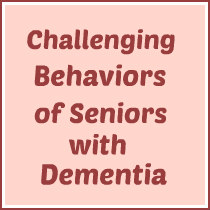If your loved one has been diagnosed with Alzheimer’s or another form of dementia, you are most likely aware of the difficulties associated with the disease. Challenging behaviors are one of the biggest issues your loved one experiences and this can be extremely challenging for family caregivers.
For example, Bill, who was diagnosed with Alzheimer’s several years ago is now blaming others for taking his money or wallet. He gets upset easily and has more anxiety than ever before. His wife, Sarah is exhausted and not sure what to do to help him.
These behaviors may have a variety of causes, but whatever the reason they are never easy to deal with. Here are some ways to help your loved one when they are confused, anxious, or experiencing other challenging dementia-related behaviors.
Aggression or hostility
- Allow them time to cool down
- Try a distraction (food or music)

- Allow them to express their feelings
- Identify the trigger and avoid it in the future
Confusion
- Create a predictable routine
- Avoid questions that require problem-solving
- Use simple words and directions (short or single words)
- Learn their past habits
- Reminisce
- Treat them gently
Anxiety
- Reduce irritable stimuli
- Play soothing music
- Let them be angry or upset as long as they are safe
- Try humor to cheer them up, as long as they do not think you are laughing at them
Wandering
- Accompany them on a walk

- Don’t pull or use force
- Make signs for doors (dead end, bathroom, do not enter)
- Give them a safe place to wander
- Take them to the bathroom
- Allow them time to rest when they are tired
- Check to see if they are hungry or in pain
Suspiciousness or paranoia
- Do not disagree with what they believe to be true
- Watch their facial expressions and body language
- Offer “help” to find missing or stolen possessions
- Be aware of their “hiding” places
- Observe them closely but discreetly
Sleeplessness
- Avoid excessive fatigue and make sure there is time for afternoon naps or rest
- Provide a calm environment
- Give a soothing snack before bedtime
- Avoid caffeinated beverages
If you are struggling to understand the cause of the difficult behavior, learn more about what your loved one is dealing with. Understand more about dementia to help deal with behaviors they can not help. From there you can determine what works and what does not work.
Potential triggers
- Was there a recent medication or medical change?
- Are they responding to pain?
- Has there been a recent change in environment or routine?
- Are they feeling frustrated or confused because they do not know how to express their emotions?

Although you can not always change your loved one’s behavior, you can decide how to respond to it. Overall, remember to stay calm and communicate as much as possible. Listen, stay calm, and slow down. Wait 60-90 seconds when asking questions and give them time to respond. Sometimes people dealing with dementia experience up to a 90-second processing delay.
As a licensed dementia care provider in Provo, Aspen Senior Day Center strives to bring the challenges associated with memory disorders into a more manageable perspective. Through individual attention, a fun environment, and sensitivity to the needs of patients and their families, Aspen Senior Day Center’s special care can relieve the burden of dementia care for several hours each day. They also provide a monthly support group to help family caregivers understand better approaches to some of their loved ones challenging behavior.
Adapted from Course Workbook ‘Therapeutic Approaches to Dementia“
Lanny Butler, MS, OTR
Cross Country Education



Comments are closed